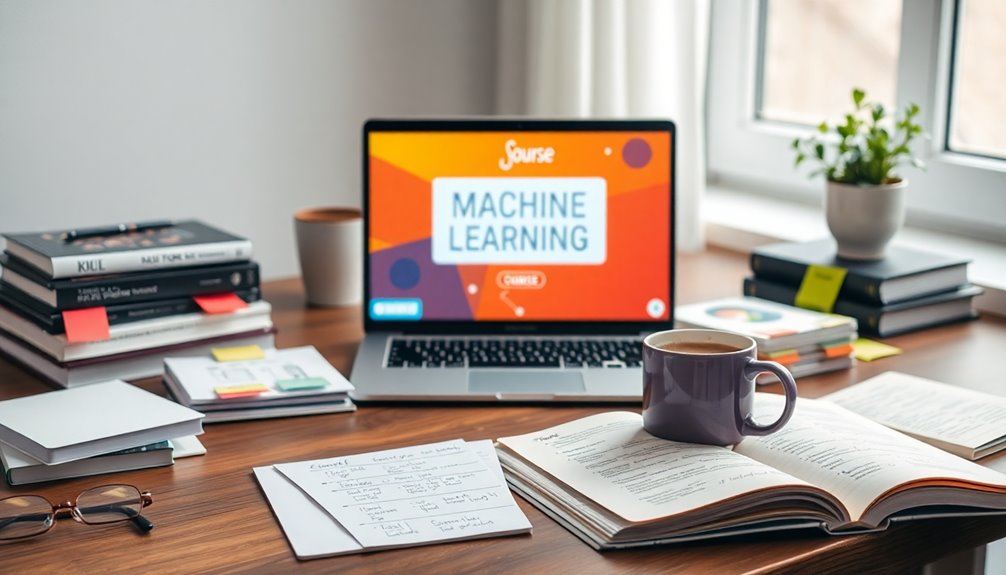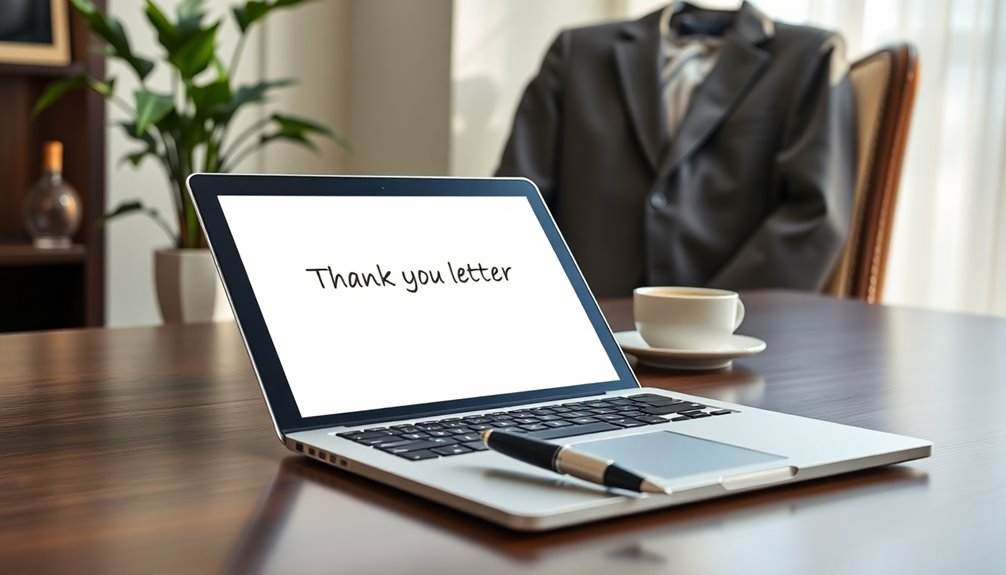To ace your machine learning engineer interview, focus on mastering key areas. Start by researching the company and its ML projects. Prepare for both technical and behavioral questions using the STAR method for structured responses. Mock interviews are invaluable—conduct several to boost your confidence. Ensure you're comfortable with algorithms and concepts like overfitting. Utilize hands-on projects from platforms like Kaggle to demonstrate your skills. Don't underestimate the power of effective communication during discussions. Embrace a growth mindset to stay positive. Ready to uncover more game-changing tips that can elevate your interview strategy?
Key Takeaways
- Master essential ML concepts such as supervised vs. unsupervised learning to demonstrate a solid foundation during interviews.
- Conduct multiple mock interviews to build confidence and receive constructive feedback on your technical and communication skills.
- Familiarize yourself with common algorithms and performance metrics to articulate your knowledge clearly and effectively.
- Research the company's ML projects and technologies to tailor your responses and show genuine interest in their work.
- Use the STAR method to structure responses for behavioral questions, providing clear examples of past experiences and problem-solving skills.
Introduction to Job Interviews

Navigating job interviews for machine learning engineer positions can be challenging but rewarding. You'll typically start with a phone screen, lasting about an hour, where you'll face interview questions designed to gauge your foundational knowledge in Machine Learning Engineering. Expect a coding question alongside technical queries that assess your grasp of essential concepts.
If you pass the phone screen, you're in for onsite rounds, usually 45 minutes to an hour each. These sessions dive deeper into your understanding of ML theory, coding abilities, and most importantly, your skills in a system design interview. Here, you'll tackle problem-solving scenarios that require clear thought processes and analytical skills.
During the design interviews, practice derivations and clarify your expectations to showcase your problem-solving capabilities effectively. Engaging in mock interviews is a game-changer; they provide a realistic simulation of job interviews and offer invaluable feedback to help you refine your performance. Remember, the more you prepare and practice, the more confident you'll feel when facing real interview questions. Take the time to understand the format and focus areas, and you'll set yourself up for success in your Machine Learning Engineering journey.
Preparing for the Interview

To succeed in your machine learning engineer interview, start with thorough research and a solid self-assessment of your skills. You'll want to polish your resume and application to highlight relevant experience effectively. Finally, employ targeted interview preparation techniques to ensure you're ready to tackle both technical and conceptual questions.
Research and Self-Assessment
Before stepping into the interview room, it's crucial to conduct thorough research on the company's machine learning projects and the technologies they use. Understanding their specific applications can significantly enhance your interview performance. Dive deep into their recent developments, and identify how your skills align with their needs.
Next, engage in self-assessment of your grasp on core machine learning concepts. Be clear on supervised vs. unsupervised learning, overfitting, underfitting, and evaluation metrics like precision and recall. This knowledge is vital when answering technical questions or discussing past projects.
Review your experiences related to machine learning, highlighting your contributions and the impact of your work. This preparation enables you to articulate your value effectively during the interview.
Additionally, participate in mock interviews to simulate real scenarios. This practice can provide valuable feedback on both your technical and behavioral responses, helping you refine your approach.
Lastly, familiarize yourself with common machine learning algorithms and frameworks like TensorFlow and PyTorch. Demonstrating your technical proficiency will show your readiness to tackle the challenges presented in the interview.
Resume and Application Preparation
Crafting a standout resume is essential in making a strong first impression during your machine learning engineer interview. Tailor your resume to highlight relevant experience in machine learning, algorithms, and programming skills. Focus on specific projects and achievements that directly align with the job description.
Don't forget to include quantifiable results; for instance, mention how you improved model accuracy by a certain percentage or successfully deployed an ML system that enhanced business outcomes. This not only shows your technical prowess but also your impact on previous roles.
Ensure your resume showcases proficiency in key programming languages and frameworks commonly used in ML, like Python, TensorFlow, and scikit-learn. Use clear and concise language, emphasizing your technical skills, educational background, and any certifications related to machine learning or data science.
Consider adding a portfolio or GitHub link to your application. This can demonstrate completed projects, algorithms you've implemented, and any contributions to open-source ML initiatives. By presenting a well-structured resume filled with relevant details and achievements, you'll set yourself apart from the competition and increase your chances of landing that interview.
Interview Preparation Techniques
Once your resume is polished and ready, it's time to shift your focus to interview preparation. Start by dedicating at least 2 weeks to 1 month to solidify your understanding of essential machine learning concepts like overfitting, regularization, and the bias-variance tradeoff. These fundamental topics are often discussed during interviews.
Next, engage in mock interviews with friends or mentors. Aim for at least five practice sessions to simulate real interview scenarios and receive constructive feedback on your performance. This will help you become comfortable with the interview format and improve your responses.
Familiarize yourself with common machine learning algorithms and their applications, as well as performance metrics like accuracy, precision, recall, and F1 score. Knowing how to discuss these topics will impress your interviewers.
Additionally, utilize online resources like Kaggle and GitHub to work on real-world datasets. This hands-on experience not only enhances your practical skills but also showcases your ability to apply theoretical knowledge. By incorporating these interview preparation techniques, you'll be well-equipped to tackle your machine learning engineer interview confidently. Furthermore, understanding natural language processing can significantly enhance your ability to engage in human-computer interaction discussions during the interview.
Dressing for Success

When it comes to dressing for your interview, choosing the right outfit can make a significant difference in how you're perceived. You'll want to consider general attire guidelines, as well as gender-specific and seasonal tips, to ensure you fit the company culture. By aligning your wardrobe with these points, you'll project professionalism and confidence from the moment you walk in.
General Attire Guidelines
Dressing appropriately for a machine learning engineer interview can set the tone for your entire interaction. First impressions matter, and your attire plays a significant role in conveying professionalism. Generally, business casual is a safe choice, striking a balance between formal and relaxed. However, it's crucial to research the company's culture beforehand, as different interview types may call for different dress codes. Some tech firms lean toward casual wear, while others expect more traditional business attire.
Make sure your clothing is clean, well-fitted, and free of wrinkles. Attention to detail in your appearance reflects your overall professionalism and shows you care about the opportunity. Opt for neutral colors to keep the focus on your qualifications, avoiding overly flashy or distracting accessories.
Footwear is another essential aspect of your attire guidelines; choose comfortable yet polished shoes. This not only keeps you at ease during the interview but also contributes to a confident demeanor. Remember, how you present yourself can significantly influence the interviewer's perception, so dress to impress and let your skills shine through!
Gender-Specific Attire Tips
Choosing the right attire for a machine learning engineer interview can make a significant difference in how you're perceived, so understanding gender-specific guidelines is essential. For men, a well-fitted suit or smart casual attire, like a blazer with a collared shirt, conveys professionalism. Women should opt for a professional dress, tailored pants, or a blouse paired with a blazer to project competence and confidence.
Stick to neutral colors such as navy, gray, and black, as these tones enhance professionalism and keep the focus on you rather than your attire. Accessories should be minimal and tasteful; a classic watch for men and simple earrings or a delicate necklace for women can elevate your look without overwhelming it. Ensure your shoes are clean and appropriate—men should wear dress shoes, while women might choose closed-toe heels or stylish flats that are comfortable for the interview setting.
Grooming is crucial, too. Maintain neat hairstyles and prioritize personal hygiene. A polished look contributes significantly to a positive first impression, reinforcing your professionalism and readiness for the role. Additionally, being aware of employer-sponsored retirement accounts can demonstrate your long-term planning mindset, which is appealing in technical fields like machine learning.
Seasonal and Casual Attire
Seasonal attire plays a crucial role in how you present yourself during a machine learning engineer interview. Dressing in business casual is often recommended, as it strikes a balance between professionalism and comfort. This approach allows you to feel confident without being overly formal. Opt for neutral colors like navy, gray, or black to create a polished, professional image that minimizes distractions.
Consider the climate when choosing your seasonal attire. In warmer months, lighter fabrics can help you stay comfortable and focused, while layering in colder months ensures you don't feel too chilly. Remember, comfortable shoes are essential, especially for onsite interviews where you might need to walk between different rooms or engage in lengthy discussions.
Avoid overly casual items like ripped jeans, t-shirts, or sneakers, as they can detract from your professional image. Instead, aim for tailored trousers or a smart dress, paired with shoes that allow you to move easily. By dressing appropriately for the season while maintaining a business casual look, you demonstrate seriousness about the role and respect for the interview process, giving you a better chance to shine.
Mastering Interview Questions

To ace your machine learning engineer interview, you need to master a variety of common interview questions, including behavioral and situational ones. Focus on industry-specific queries and advanced techniques that showcase your expertise. This preparation will help you confidently tackle the diverse range of questions you'll face during the interview process.
Common Interview Questions
Mastering common interview questions is essential for aspiring machine learning engineers. You'll likely be asked about concepts like the bias-variance tradeoff, overfitting, and underfitting. Understanding these topics demonstrates your grasp of foundational principles. Be ready to explain regularization techniques and their importance in model performance.
Expect questions on supervised and unsupervised learning. You should articulate the differences clearly, providing examples such as K-Nearest Neighbors (KNN) for classification and K-means for clustering. This shows you can apply theoretical knowledge to practical scenarios.
Model evaluation metrics are another crucial area. Familiarize yourself with accuracy, precision, recall, F1 score, and ROC-AUC. Interviewers want to know how you assess model performance effectively.
Additionally, proficiency in algorithm explanations is key. When asked to simplify complex concepts—like decision trees or neural networks—make sure you can convey your ideas clearly and succinctly. This ability not only reflects your knowledge but also your communication skills, which are vital in any engineering role. By preparing for these common interview questions, you'll boost your confidence and increase your chances of acing the interview.
Behavioral and Situational Questions
After preparing for common technical questions, it's time to focus on behavioral and situational questions that interviewers often use to gauge your soft skills. Behavioral questions assess your problem-solving abilities, teamwork, and adaptability in challenging situations, so it's crucial to prepare specific examples from your past experiences. Use the STAR method (Situation, Task, Action, Result) to structure your responses. This approach provides clear narratives that highlight your accomplishments and the lessons you've learned.
Situational questions present hypothetical scenarios relevant to the machine learning role, requiring you to demonstrate your decision-making process and prioritization skills. Be ready to outline your approach and reasoning, showcasing how you would tackle real-world challenges. Interviewers often look for traits like conflict resolution, growth mindset, and communication skills. Share real-life examples where you overcame obstacles or collaborated with diverse teams. Incorporating elements of storytelling in your responses, much like the narratives found in Reginas Quaint Journeys, can enhance your engagement with the interviewer.
Practicing mock interviews that include these behavioral and situational questions can significantly enhance your confidence. The more you articulate your thought processes and experiences, the more fluid and impactful your responses will be during the actual interview. So, get ready to shine by mastering these critical questions!
Industry-Specific Questions
Industry-specific questions are crucial in machine learning interviews, as they allow you to demonstrate your expertise and understanding of the field. Familiarize yourself with common inquiries related to recent advancements, especially in AutoML and explainable AI. These topics are increasingly relevant, so knowing them can set you apart.
Be ready to discuss the bias-variance tradeoff and its implications for model performance, as many interviewers expect a solid grasp of this foundational concept. You should also prepare to explain evaluation metrics specific to your industry. For example, understanding precision and recall in healthcare diagnostics or AUC-ROC for fraud detection models will help you tailor your responses effectively.
Additionally, be informed about the latest applications of deep learning within your field. Whether it's using convolutional neural networks for image processing or recurrent neural networks for time-series analysis, showcasing this knowledge is key. Lastly, review case studies of successful machine learning implementations in your industry. Interviewers often ask you to analyze real-world applications and propose solutions to challenges, so being prepared will boost your confidence and performance.
Advanced Question Techniques
Navigating an interview successfully often hinges on how well you handle advanced questions. When faced with ambiguous interview questions, take a moment to clarify them. This ensures you fully understand the problem and can align your response with the interviewer's expectations.
As you tackle advanced ML questions, like those involving overfitting and regularization techniques, practice articulating your thought process out loud. This not only demonstrates your analytical thinking but also allows the interviewer to follow your reasoning. Be ready to provide real-world applications and examples to back up your knowledge.
Mock interviews can be invaluable. Engage with peers or industry professionals, focusing specifically on advanced topics and question types. This practice helps you receive constructive feedback and refine your approach. Don't forget to prepare for behavioral questions that reflect core company values, as these can also be part of your interview.
Asking Insightful Questions

Asking insightful questions can set you apart in a machine learning engineer interview. Focus on strategic inquiries that reveal your understanding of the role, such as the team's current projects or their approach to model evaluation. Don't forget to close the conversation by clarifying expectations and growth opportunities, ensuring the position aligns with your career goals.
Strategic Questions to Impress
Demonstrating genuine interest during your interview can set you apart from other candidates, and one effective way to do this is by asking strategic questions. Start by inquiring about the company's current machine learning projects. This shows you're invested in their work and helps you evaluate how well your skills align with their needs.
Next, ask about the challenges the team faces in deploying machine learning models. This gives you insights into the technical environment and highlights areas where you can contribute. Questions about the company's approach to feature engineering and data preprocessing can further showcase your technical expertise, emphasizing your understanding of crucial components in model performance.
Don't forget to explore how the team collaborates with other departments, like product management or data engineering. This illustrates your recognition of the multidisciplinary nature of machine learning projects. Lastly, inquire about opportunities for professional development and training within the company. This signals your commitment to continuous learning and improvement as an ML engineer, making a strong impression on your interviewers. By asking these strategic questions, you position yourself as a thoughtful and engaged candidate.
Closing Questions
As your interview wraps up, the opportunity to ask insightful questions can further solidify your candidacy. Use this time to demonstrate your genuine interest in the role and your understanding of the company's machine learning applications. Start by inquiring about the specific machine learning projects the team is currently tackling. This not only reveals their processes but also shows you're eager to contribute.
Next, delve into their approach to model evaluation and performance metrics. This question can uncover the company's priorities and practices in maintaining high-quality ML systems. It also highlights your knowledge of essential ML concepts.
Don't forget to ask about opportunities for professional development and continuous learning within the organization. This reflects your commitment to growth in this rapidly evolving field and shows you're invested in your long-term career.
Finally, consider questions about team dynamics and collaboration methods. Understanding how cross-functional teams operate can provide valuable context on how they succeed in delivering ML solutions. These closing questions will leave a lasting impression and reinforce your enthusiasm for the position.
Effective Communication and Presentation

When you're in an interview, crafting the perfect response is essential to convey your expertise clearly. Your body language and confidence can greatly influence how your message is received, so pay attention to both. By mastering these elements, you'll make a strong impression and effectively communicate your knowledge.
Crafting the Perfect Response
Crafting clear and effective responses during your interview is crucial for showcasing your skills and thought processes. When tackling Machine Learning Interview Questions, it's essential to articulate your problem-solving approach. This demonstrates not just your technical knowledge but also your analytical thinking.
For behavioral questions, use the STAR method (Situation, Task, Action, Result) to structure your responses. This helps you deliver a concise yet comprehensive narrative of your experiences, making it easier for interviewers to grasp your capabilities. When faced with ambiguous problems, don't hesitate to ask clarifying questions. This ensures you and the interviewer are aligned on expectations, which is vital for a successful dialogue.
Additionally, presenting multiple solutions or approaches to a problem can set you apart. It shows you're flexible and capable of considering different perspectives. Maintain a conversational tone throughout the interview, and engage your interviewer by inviting them to ask questions or provide feedback. This fosters a collaborative atmosphere, making the interview feel less like an interrogation and more like a discussion, ultimately leading to crafting the perfect response.
Body Language and Confidence
Effective body language and confidence play a crucial role in how you communicate during a machine learning engineer interview. Maintaining eye contact shows confidence and engagement, making a strong impression on your interviewers. Open body language, such as uncrossed arms and a relaxed posture, projects approachability and self-assurance, helping to create a comfortable environment for discussion.
Practice your responses out loud to enhance clarity and fluency. This preparation boosts your confidence when discussing technical concepts, allowing you to articulate your ideas effectively. Using hand gestures while explaining your thoughts not only emphasizes key points but also demonstrates your enthusiasm about your expertise and experiences.
Be mindful of your tone and pace while speaking. A calm, steady voice conveys confidence and authority, which can significantly influence how your message is received. Remember, the way you present yourself can be just as important as your technical knowledge. By mastering your body language and exuding confidence, you'll foster engagement and approachability, making it easier for your interviewers to connect with you. These non-verbal cues can set you apart from other candidates and leave a lasting impression. Additionally, practicing mindfulness techniques can enhance your overall mental clarity, helping you to remain focused and composed during the interview.
Post-Interview Strategies

After your interview, your next steps can make all the difference. Sending personalized thank-you emails shows your enthusiasm, while reflecting on your performance helps you grow. Whether you receive an offer or a rejection, handling the situation professionally will keep doors open for future opportunities.
Follow-Up Communications
Since the interview process can be intense, your follow-up communication is a crucial opportunity to reinforce your candidacy. Sending a thank-you email to your interviewers within 24 hours can leave a lasting positive impression and showcase your enthusiasm for the role. In your message, briefly reiterate your interest and mention a specific discussion point from the interview to personalize your communication.
Reflect on your performance during the interview and include any insights or additional thoughts you might have. This demonstrates your proactive approach and willingness to improve. Keep your follow-up concise and professional, but encourage any further questions or clarifications from the interviewers. This not only shows your initiative but also keeps the lines of communication open.
If you haven't heard back within the expected timeframe, don't hesitate to check in with the recruiters. A polite follow-up shows your continued interest in the opportunity and keeps you on their radar. Remember, effective follow-up communications can make all the difference in your job search, so approach this step with care and enthusiasm.
Handling Offers and Rejections
Navigating job offers and rejections can be a pivotal moment in your career journey. When you receive a job offer, take the time to evaluate the entire compensation package. Look beyond the salary—consider bonuses, benefits, and growth opportunities to ensure it aligns with your career goals and market standards. Don't hesitate to negotiate offers; many companies have flexibility in their compensation structures that can significantly enhance your overall package. Additionally, understanding strategic applications can help you present a compelling case during negotiations.
If you face a rejection, view it as an opportunity for growth. Analyze any feedback provided by the interviewers to identify areas for improvement in your skills or interview techniques. This will prepare you better for future opportunities.
Regardless of the outcome, maintain a positive relationship with recruiters and interviewers. Networking is vital, as it can lead to potential future openings or referrals within the industry. Keep your options open by staying proactive; continue applying for other positions and attending industry events. By doing so, you'll not only enhance your chances of success but also stay aligned with your career goals, ensuring you're always moving forward in your journey.
Interviewing in Remote Settings

When you're interviewing remotely, it's crucial to understand the technologies at play, especially with video conferencing tools. You'll also want to be prepared for language proficiency assessments, as effective communication is key in this format. Keep an eye on emerging AI trends that could shape the interview process and enhance your experience.
Remote Interviewing Technologies
In today's digital landscape, mastering remote interviewing technologies is crucial for machine learning engineer candidates. Remote interviews often utilize platforms like Zoom, Microsoft Teams, or Google Meet for video conferencing and screen sharing during coding exercises. It's essential to familiarize yourself with these tools beforehand to reduce anxiety and enhance your performance.
Many companies rely on coding interview tools such as CoderPad or HackerRank, which allow you to write and execute code in real-time while interviewers monitor your progress. To avoid technical glitches, ensure you have a stable internet connection and a quiet, distraction-free environment. This preparation can make a significant difference in your interview experience.
Additionally, be ready to use collaborative whiteboarding tools like Miro or MURAL. These platforms enable you to visually present your ideas and solutions during design discussions, showcasing your understanding and creativity. By being comfortable with these technologies, you'll not only improve your confidence but also impress your interviewers with your adaptability to remote settings. Embrace these tools, and you'll be well on your way to acing your machine learning engineer interview!
Language Proficiency Assessment
Mastering the right technologies for remote interviews sets the stage for success, but language proficiency plays a vital role in effective communication. In remote interviews, you need to articulate your thoughts clearly and concisely, especially when discussing complex technical concepts. Practice coding and explaining your work out loud to enhance your fluency and reduce anxiety. Simulating real interview conditions can significantly boost your confidence.
Utilize collaboration tools like CoderPad during these interviews. They not only allow you to showcase your coding skills but also give you a platform to demonstrate your language proficiency as you explain your approach. Familiarizing yourself with technical jargon in both your native language and English is crucial. It helps you express yourself more effectively and enhances your overall performance.
Engaging in mock interviews with peers or mentors online can provide valuable feedback on your communication skills. This practice lets you refine your language proficiency and get comfortable discussing technical topics. Remember, clear communication is key in remote interviews, so invest time in honing these skills to set yourself apart from other candidates. Additionally, employing data-driven marketing strategies can help you identify areas for improvement in your interview preparation process.
Emerging AI Interview Trends
Remote interviews for Machine Learning Engineer positions are evolving rapidly, with several emerging trends shaping how candidates showcase their skills. First and foremost, make sure you have a reliable internet connection and a distraction-free environment. This is crucial for presenting yourself effectively during remote interviews. Companies are increasingly utilizing coding platforms like CoderPad or HackerRank for real-time coding challenges, so be prepared to share your screen and solve problems on the spot.
Additionally, asynchronous assessments are becoming more common. These may include take-home coding assignments or tasks for developing ML models, allowing you to demonstrate your abilities without the pressure of a live interview. During design interviews, focus on not just your technical skills but also your thought process and problem-solving approach.
Behavioral interviews in remote settings often emphasize communication skills and teamwork, as it's essential to show you can collaborate in a distributed environment. Finally, be ready for potential technical challenges—troubleshooting software issues or adapting to different coding environments can happen. Embrace these trends, and you'll be well on your way to acing your Machine Learning Engineer interview!
Confidence and Mindset

Building unshakeable confidence is crucial for acing your machine learning engineer interview. You can inspire yourself through motivational strategies, like reflecting on past successes and visualizing positive outcomes. By adopting a growth mindset, you'll turn challenges into opportunities, boosting your performance and reducing anxiety. Additionally, practicing daily affirmations can reinforce your belief in your abilities and enhance your overall mindset.
Building Unshakeable Confidence
How can you cultivate unshakeable confidence for your machine learning engineer interview? Start by embracing a growth mindset. Accept challenges as opportunities to learn and grow, and actively seek feedback from peers or mentors. This approach not only enhances your skills but also builds your confidence as you see progress over time.
Thorough preparation is key. Mastering essential ML concepts and algorithms allows you to tackle interview questions with clarity and assurance. Practice mock interviews to simulate real scenarios; this familiarity will boost your self-assurance and help you respond more effectively under pressure.
Additionally, reflect on past successes. Acknowledge your achievements and maintain positive self-talk to reinforce your belief in your capabilities. Visualization techniques can also be powerful. Picture yourself succeeding in the interview, which can psychologically prepare you and significantly elevate your confidence levels.
Inspirational and Motivational Strategies
Developing unshakeable confidence sets the stage for a successful machine learning engineer interview. To achieve this, cultivate a growth mindset that views challenges as opportunities. This adaptability is key in the ever-evolving landscape of machine learning technologies. Engaging in consistent mock interviews helps you familiarize yourself with the format and receive valuable feedback, enhancing your confidence.
Visualization techniques can also play a crucial role. Picture yourself succeeding in the interview and effectively communicating complex concepts. This mental practice can boost your self-assurance and ease anxiety during high-pressure moments. Additionally, incorporating mindfulness and stress-reduction techniques, such as deep breathing or meditation, will sharpen your focus and clarity of thought. Practicing mindfulness techniques can help block internal chatter and external distractions, allowing you to concentrate better during the interview.
Building a supportive community of peers and mentors in the machine learning field is invaluable. They can provide encouragement, share experiences, and offer insights that foster a sense of belonging and confidence in your abilities. Remember, confidence isn't just about knowing your stuff; it's about believing in your capacity to grow and learn. With the right mindset and support, you're not just preparing for an interview — you're gearing up for a successful career in machine learning.
Practice Mock Interviews Frequently

Practicing mock interviews frequently is crucial for your preparation. It not only helps you get comfortable with the interview format but also sharpens your understanding of essential ML concepts. By simulating real scenarios, you'll gain valuable feedback to refine your skills and boost your confidence.
Essential Items and Preparation
Mock interviews are a crucial part of your preparation for a machine learning engineer interview, serving not just as practice but as a way to build confidence and familiarity with the interview process. Engaging in at least five mock interviews with peers or mentors can significantly enhance your understanding of various interview formats and help you solidify essential ML concepts.
These realistic simulations allow you to refine your responses while receiving valuable performance feedback. You'll quickly identify areas for improvement, boosting your communication skills and overall presentation. By integrating the feedback into your practice, you can develop a personalized run-book that outlines strategies and responses tailored to your strengths and weaknesses.
Consider utilizing online platforms for mock interview bookings and coaching, as they offer structured and accessible practice opportunities. Continuous engagement in mock interviews not only reinforces your technical knowledge but also prepares you mentally for the pressure of the actual interview environment. Additionally, practicing your responses can help you better understand the impact of Natural Language Processing on user interactions, making your answers more relevant in a data-driven world. Remember, the more you practice, the more comfortable and confident you'll become, setting you up for success when it's time for the real thing.
Final Preparation Steps
Engage in frequent mock interviews to solidify your final preparation for the machine learning engineer interview. Aim for at least five sessions to enhance your readiness for machine learning design rounds. Practicing with peers or mentors creates realistic simulations of interview scenarios, allowing you to gain valuable feedback on your performance and communication skills.
As you work through these mock interviews, focus on refining your understanding of key ML concepts. This practice helps you articulate your solutions clearly and effectively during actual interviews. You'll find that developing a personalized run-book for interview success becomes easier, as you'll outline strategies for tackling common ML questions and challenges.
Consider utilizing online platforms for booking mock interviews and coaching sessions. This approach can supplement your preparation by providing access to industry-specific insights and expert guidance. With regular mock interview practice, you'll build the confidence needed to navigate the interview process successfully. Remember, the more familiar you are with the format and questions, the more prepared you'll feel when it's time for the real deal.
Interview Structure and Flow

Understanding the interview structure for a Machine Learning Engineer position is crucial for success. Typically, the process starts with a phone screen, which includes a one-hour technical assessment. This initial round focuses on coding questions and ML-specific inquiries, setting the tone for what's to come.
If you advance, the onsite interviews await. These consist of a series of rounds, each lasting 45 minutes to an hour, diving deep into ML theory, system design, and practical coding skills. During these sessions, you'll need to clarify your understanding of various topics, as interviewers may have a different perspective on what they expect.
Mock interviews can be incredibly beneficial. They help simulate the interview experience, allowing you to familiarize yourself with the interview flow and expectations. By practicing, you'll feel more confident discussing key concepts and demonstrating your skills in real-time scenarios.
Keep in mind that every company may have a slightly different interview structure. Thus, being adaptable and prepared for a range of topics will serve you well. Embrace this structure, and you'll be one step closer to nailing your Machine Learning Engineer interview.
Summarize Interview Preparation Essentials

How can you best prepare for a Machine Learning Engineer interview? Start by mastering core concepts like supervised vs. unsupervised learning and understanding the nuances of overfitting vs. underfitting. These topics often come up during interviews, so a solid grasp is crucial. Allocate 2 weeks to 1 month for a focused revision of foundational ML topics, using textbooks and online courses for deeper insights.
Next, engage in mock interviews—aim for at least five sessions with peers. This practice simulates the interview experience and provides valuable feedback on your performance. Familiarize yourself with common machine learning system design questions, such as constructing recommendation systems. Develop a structured approach to tackle these challenges effectively.
Additionally, stay updated on current trends in ML tech, including explainable AI and automated machine learning (AutoML). Showcasing your awareness of industry advancements can set you apart during discussions with interviewers. By following these preparation essentials, you'll equip yourself with the knowledge and confidence needed to ace your interview and land that coveted Machine Learning Engineer position.
Encouragement and Final Thoughts

Preparing for a Machine Learning Engineer interview can feel daunting, but remember that it's also an opportunity for growth. Embrace a growth mindset by viewing challenges as chances to improve. Each interview is a valuable experience that offers feedback, guiding you toward refining your skills and approach.
Don't underestimate the power of practice. Engaging in mock interviews can significantly boost your confidence and performance during real interviews. They help you familiarize yourself with common questions and allow you to clarify your thought process, which showcases your analytical abilities to potential employers.
Networking within the machine learning community is another crucial aspect. Connecting with professionals can lead to mentorship opportunities, offering insights and guidance that can enhance your preparation.
After each interview, reflect on what went well and identify areas for improvement. This practice not only helps you grow but also positions you better for future opportunities.
Stay encouraged and persistent. Your efforts will pay off, and with each step, you're moving closer to landing the role you desire. Keep learning, stay connected, and believe in your journey!
Frequently Asked Questions
How to Ace a Machine Learning Interview?
To ace a machine learning interview, start by mastering key concepts like overfitting, regularization, and the bias-variance tradeoff. Practice coding questions and articulate your thought process clearly. Engage in mock interviews to simulate real scenarios and receive feedback. Familiarize yourself with common system design questions and stay updated on trends like AutoML and explainable AI. Show how these innovations impact real-world applications, and you'll make a strong impression on your interviewers.
What Are the Interview Questions on Ensemble Learning?
In your interview, you might face questions about ensemble learning, like the advantages it offers over single models. Be ready to explain techniques such as bagging and boosting, highlighting algorithms like Random Forests and Gradient Boosting Machines. Interviewers could also ask about the bias-variance tradeoff, so understand how ensembles can reduce variance while keeping bias low. Lastly, prepare examples of scenarios where ensemble methods shine, especially in competitive settings like Kaggle.
What Are ML Interviews Like?
ML interviews typically start with a phone screen where you'll tackle coding and machine learning questions. If you pass, onsite rounds await, focusing on ML theory and system design. Expect to discuss concepts like overfitting and regularization while solving practical problems, such as designing recommendation systems. It's crucial to clarify expectations during the interview, and practicing through mock interviews can help you feel more prepared for the real thing.
How to Prepare for ML Coding Round?
To prepare for your ML coding round, focus on mastering core data structures and algorithms like arrays and trees. Practice coding problems on platforms like LeetCode and HackerRank, especially in recursion and dynamic programming. Familiarize yourself with Python libraries such as NumPy and pandas, as you'll likely need them for data manipulation. Review key ML concepts like overfitting and evaluation metrics, and conduct mock interviews to sharpen your problem-solving skills and communication.
Augustus is the visionary leader and Editor-in-Chief of Personality-Test.net. With an unwavering commitment to quality and authenticity, he oversees all content, ensuring it enlightens and empowers our audience. Augustus believes deeply in the transformative power of self-awareness and is dedicated to making Personality-Test.net a beacon for those on a journey to understand themselves better.










